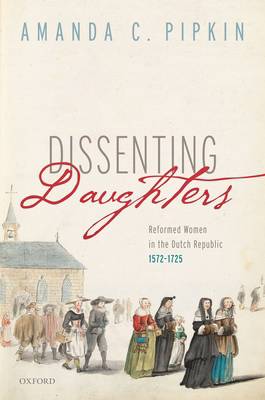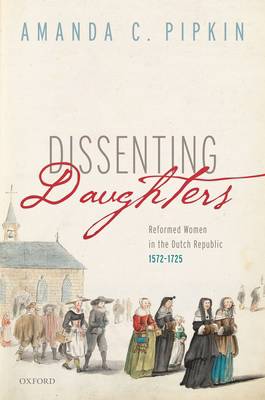
Bedankt voor het vertrouwen het afgelopen jaar! Om jou te bedanken bieden we GRATIS verzending (in België) aan op alles gedurende de hele maand januari.
- Afhalen na 1 uur in een winkel met voorraad
- In januari gratis thuislevering in België
- Ruim aanbod met 7 miljoen producten
Bedankt voor het vertrouwen het afgelopen jaar! Om jou te bedanken bieden we GRATIS verzending (in België) aan op alles gedurende de hele maand januari.
- Afhalen na 1 uur in een winkel met voorraad
- In januari gratis thuislevering in België
- Ruim aanbod met 7 miljoen producten
Zoeken
Dissenting Daughters
Reformed Women in the Dutch Republic, 1572-1725
Amanda C Pipkin
Hardcover | Engels
€ 185,45
+ 370 punten
Omschrijving
Dissenting Daughters reveals that devout women made vital contributions to the spread and practice of the Reformed faith in the Dutch Republic in the sixteenth and seventeenth centuries. The six women at the heart of this study: Cornelia Teellinck, Susanna Teellinck, Anna Maria van Schurman, Sara Nevius, Cornelia Leydekker, and Henrica van Hoolwerff, were influential members of networks known for supporting a religious revival known as the Further Reformation. These women earned the support and appreciation of their religious leaders, friends, and relatives by seizing the tools offered by domestic religious study and worship and forming alliances with prominent ministers including Willem Teellinck, Gijsbertus Voetius, Wilhelmus à Brakel, and Melchior Leydekker as well as with other well-connected, well-educated women. They deployed their talents to bolster the Dutch Reformed Church from 1572, the first year its members could publicly organize, to the death of this book's last surviving subject Cornelia Leydekker in 1725. In return for their adoption of religious teachings that constricted them in many ways, they gained the authority to minister to their family members, their female friends, and a broader audience of men and women during domestic worship as well as through their written works. These "dissenting daughters" vehemently defended their faith - against Spanish and French Catholics, as well as their neighbors, politicians, and ministers within the Dutch Republic whom they judged to be lax and overly tolerant of sinful behavior, finding ways to flourish among the strictest orthodox believers within the Dutch Reformed Church.
Specificaties
Betrokkenen
- Auteur(s):
- Uitgeverij:
Inhoud
- Aantal bladzijden:
- 280
- Taal:
- Engels
Eigenschappen
- Productcode (EAN):
- 9780192857279
- Verschijningsdatum:
- 3/10/2022
- Uitvoering:
- Hardcover
- Formaat:
- Genaaid
- Afmetingen:
- 165 mm x 238 mm
- Gewicht:
- 616 g

Alleen bij Standaard Boekhandel
+ 370 punten op je klantenkaart van Standaard Boekhandel
Beoordelingen
We publiceren alleen reviews die voldoen aan de voorwaarden voor reviews. Bekijk onze voorwaarden voor reviews.









